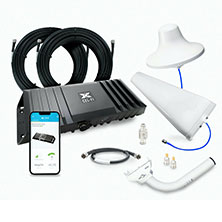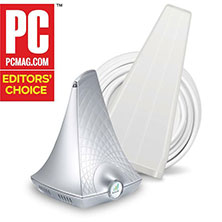Common Myths About Home Signal Boosters Debunked
There’s nothing more annoying than trying to unwind at home while battling poor cell signal and slow streaming. Sometimes, it's enough to make you think about packing up and moving to a new place. With a home cell phone signal booster, such a drastic step is not necessary.
However, with so many home signal booster misconceptions out there, you're probably wondering if they’re worth the investment. You're not alone. That's why, in this article, we'll be debunking common myths about home signal boosters.
Take advantage of our system design and installation services. Learn more or call us for a free consultation: 1-800-969-8189.
Myth 1: Signal Booster Do Not Work, They Are a Scam
The myth that signal boosters don’t work comes from a lack of understanding of how they function.
So, how do signal boosters work? These devices take your existing outside cell signals, amplify them, and rebroadcast them indoors. Performance depends on existing cellular signal strength.
Homes with decent outside cellular signal strength will get better in-door coverage results than those in weak signal areas. And if there is no signal to begin with, there is nothing for them to amplify and rebroadcast. While home signal boosters can work wonders, they are not magic.
Many people assume boosters are a scam simply because they expect full coverage, even in areas with little to no signal.
Myth 2: Signal Boosters Are Illegal, Hazardous and Cause Interference
Boosters that fail to meet FCC standards pose a risk of interfering with wireless networks. To address this concern, in 2014, the FCC mandated that only certified and tested boosters be allowed for use in the United States. However, beware of counterfeit, non-FCC-certified units found on Amazon and eBay. They typically do not perform as advertised, contributing to people believing that signal boosters are a scam and do not work. Today, major carriers like AT&T, T-Mobile, and Verizon permit the use of FCC-approved boosters, provided they are properly registered.
As for safety concerns, while getting a signal booster for home use, there is no conclusive evidence that mobile signal boosters pose any health risks. They emit non-ionizing EMF radiation, the same type produced by cell phones and Wi-Fi devices, which is generally considered harmless. However, if you prefer to minimize exposure, consider these precautionary measures:
- Turn off your phone at night to allow your body to rest.
- Use wired connections whenever possible instead of Wi-Fi or Bluetooth.
- Power down routers and home signal boosters when not in use.
- Use speakerphone or wired headphones to reduce direct contact with your phone.
At Signal Boosters, we only offer FCC-certified boosters that meet all legal and safety requirements, ensuring they operate within safe parameters without causing interference to other devices or networks.
Myth 3: Signal Boosters Only Work for One Carrier
While some boosters are carrier-specific, offering more power at a higher price point, the majority of signal boosters for home use support multiple carriers simultaneously.
For example, the weBoost Home MultiRoom can amplify signals from AT&T, Verizon, and T-Mobile at the same time, ensuring smooth connectivity for everyone under your roof. On the other hand, carrier-specific models like the Cel-Fi GO X G32 are designed to amplify signals for one carrier, maximizing performance for that specific network.
Choosing between a multi-carrier booster and a carrier-specific one depends on your specific needs. At Signal Boosters, we offer both multi-carrier and carrier-specific solutions to ensure you get the right booster for your situation, whether you need broad coverage for multiple networks or a high-powered boost for a single provider.

weBoost Home MultiRoom

Cel-Fi GO X G32
Myth 4: Boosters Require Complex and Expensive Installation
It's a common belief that signal boosters require extensive technical knowledge or professional assistance for installation.
While some elbow grease is needed, the majority of cell phone boosters for home are DIY-installation friendly. They include detailed installation manuals, and many also offer an app with how-to videos and step-by-step instructions. Nothing too complicated.
For those who do not want anything to do with setting up the unit, home boosters like the weBoost Home Complete Installed, include a professional installation, ensuring optimal placement for maximum performance.
Everything needed for better cell signal is in the box, including mounting hardware and cables. This makes the process straightforward for even the least tech-savvy individuals which busts one of the most prevalent myths about home signal boosters.
Myth 5: Signal Boosters Are Only For Rural Areas
Often located at the edge of the network, far from cell towers, rural areas are often plagued with poor cellular reception. Thus, cell phone boosters have proven to be a game changer in these regions, helping improve indoor connectivity for work and play.
However, the widespread use of mobile signal boosters in rural areas does not mean they’re not as effective and valuable in urban settings. Cities often face their own cell phone signal challenges due to tall buildings, thick walls, and noisy networks.
Cell phone signal boosters help alleviate these challenges by fine-tuning communications with nearby cell towers and bypassing signal-blocking building materials. This results in better call quality, faster data speeds, and overall improved connectivity, even in urban environments.
Myth 6: All Home Signal Boosters Are the Same
Signal boosters vary in power, coverage, and carrier compatibility. Choosing the best signal boosters for home depends on your requirements. Therefore, before you decide to invest in a cell service booster, you must consider factors like the size of your space and existing signal strength.
For example, the weBoost Home Complete is ideal for larger homes, offering high amplification power and multi-carrier support. On the other hand, compact models like the SureCall Flare 3.0 are perfect for smaller areas. Each mobile cell phone booster is designed to meet specific needs, so investing in the right one ensures optimal performance.
Check out our top-rated home signal boosters to find the solution that is most suitable for your home size and carrier needs.

weBoost Home Complete

SureCall Flare 3.0
Clearing the Air About Home Signal Boosters
There’s a lot of misinformation about signal boosters, but hopefully, this clears up any confusion to help you make an informed decision.
They’re legal, safe, and versatile, offering solutions for both rural and urban areas. From easy DIY installation to multi-carrier support, these devices provide seamless connectivity for every scenario. For more information, explore our Home Signal Booster FAQs to get answers to common concerns.
If you’re tired of dropped calls and slow data, Signal Boosters can help! Our FCC-certified products and expert guidance will help you find the perfect solution for your connectivity needs. If you have any questions, please give us a call at 1-800-470-6777.
Interested in Learning More? Check Out Our Cellular Info Hub / WiFi Info Hub





